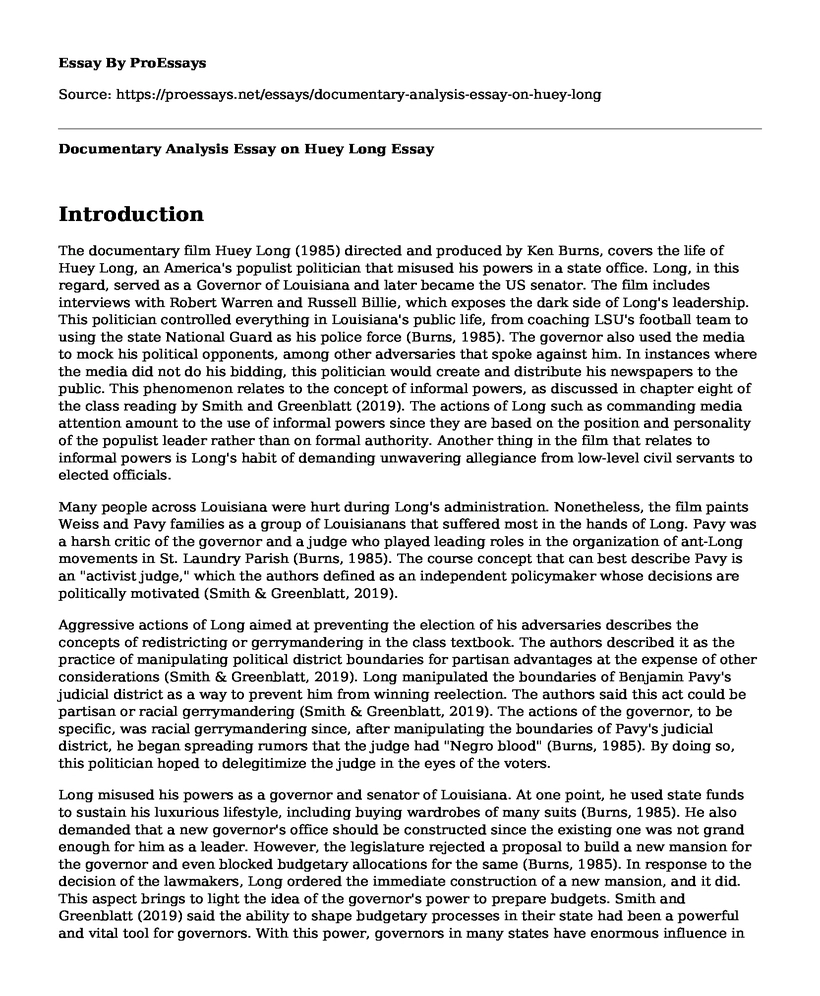Introduction
The documentary film Huey Long (1985) directed and produced by Ken Burns, covers the life of Huey Long, an America's populist politician that misused his powers in a state office. Long, in this regard, served as a Governor of Louisiana and later became the US senator. The film includes interviews with Robert Warren and Russell Billie, which exposes the dark side of Long's leadership. This politician controlled everything in Louisiana's public life, from coaching LSU's football team to using the state National Guard as his police force (Burns, 1985). The governor also used the media to mock his political opponents, among other adversaries that spoke against him. In instances where the media did not do his bidding, this politician would create and distribute his newspapers to the public. This phenomenon relates to the concept of informal powers, as discussed in chapter eight of the class reading by Smith and Greenblatt (2019). The actions of Long such as commanding media attention amount to the use of informal powers since they are based on the position and personality of the populist leader rather than on formal authority. Another thing in the film that relates to informal powers is Long's habit of demanding unwavering allegiance from low-level civil servants to elected officials.
Many people across Louisiana were hurt during Long's administration. Nonetheless, the film paints Weiss and Pavy families as a group of Louisianans that suffered most in the hands of Long. Pavy was a harsh critic of the governor and a judge who played leading roles in the organization of ant-Long movements in St. Laundry Parish (Burns, 1985). The course concept that can best describe Pavy is an "activist judge," which the authors defined as an independent policymaker whose decisions are politically motivated (Smith & Greenblatt, 2019).
Aggressive actions of Long aimed at preventing the election of his adversaries describes the concepts of redistricting or gerrymandering in the class textbook. The authors described it as the practice of manipulating political district boundaries for partisan advantages at the expense of other considerations (Smith & Greenblatt, 2019). Long manipulated the boundaries of Benjamin Pavy's judicial district as a way to prevent him from winning reelection. The authors said this act could be partisan or racial gerrymandering (Smith & Greenblatt, 2019). The actions of the governor, to be specific, was racial gerrymandering since, after manipulating the boundaries of Pavy's judicial district, he began spreading rumors that the judge had "Negro blood" (Burns, 1985). By doing so, this politician hoped to delegitimize the judge in the eyes of the voters.
Long misused his powers as a governor and senator of Louisiana. At one point, he used state funds to sustain his luxurious lifestyle, including buying wardrobes of many suits (Burns, 1985). He also demanded that a new governor's office should be constructed since the existing one was not grand enough for him as a leader. However, the legislature rejected a proposal to build a new mansion for the governor and even blocked budgetary allocations for the same (Burns, 1985). In response to the decision of the lawmakers, Long ordered the immediate construction of a new mansion, and it did. This aspect brings to light the idea of the governor's power to prepare budgets. Smith and Greenblatt (2019) said the ability to shape budgetary processes in their state had been a powerful and vital tool for governors. With this power, governors in many states have enormous influence in their dealings with state agencies and departments, including the legislature (Smith & Greenblatt, 2019). In the film, Long used the budget process to override the decision of the parliament, thus illustrates the concept of the power to prepare a budget at a state level. Smith and Greenblatt (2019) also talked about appointment powers, which refer to a prerogative to pick a person to run an office. In the film, this concept is apparent in a scene where the governor appointed himself the state's chief legal counsel who would represent the state in all lawsuits against private businesses (Burns, 1985).
References
Burns, K. (1985). Huey Long [Video]. Youtube. https://www.youtube.com/watch?v=flzAe7qEYlc
Smith, K. B., & Greenblatt, A. (2019). Governing states and localities. CQ Press.
Cite this page
Documentary Analysis Essay on Huey Long. (2023, May 06). Retrieved from https://proessays.net/essays/documentary-analysis-essay-on-huey-long
If you are the original author of this essay and no longer wish to have it published on the ProEssays website, please click below to request its removal:
- Chris Brown Biography
- Comparative Analysis of the Color Purple and Schindler's List Essay
- A Star is Born (1937) Film Essay Example
- The Jazz Age Essay
- Critical Reasoning Essay on Healthcare
- Essay Example on Realist Art: Reflections of Social Struggles
- Cinema: Combining Technology, Aesthetics, Entertainment & Business - Essay Sample







